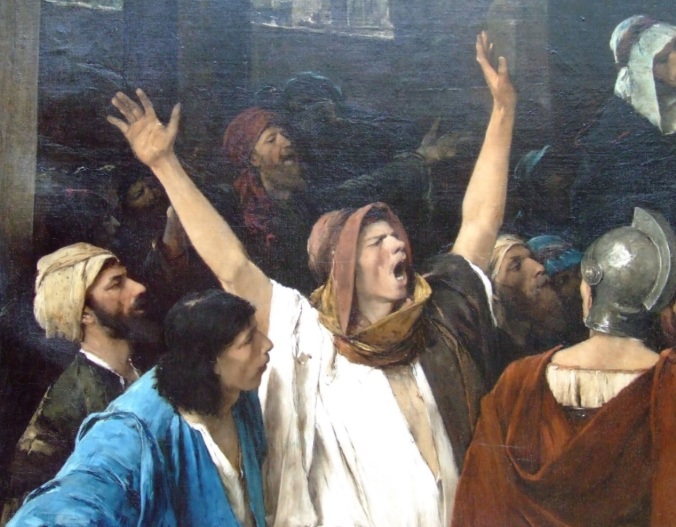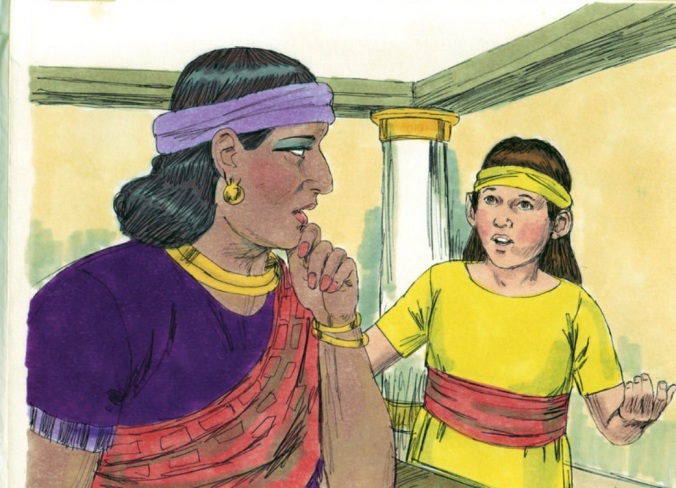“Go therefore and make disciples of all the nations…teaching them to observe all that I commanded you; and lo, I am with you always, even to the end of the age” (Matthew 28:19-20, NASB).
——————–
Contents:
1) “What Then Shall I Do With Jesus Who Is Called Christ?” (Bill Crews)
2) “Evidence of Things Not Seen” (Greg Gwin)
3) You Don’t Deserve Mercy (Doy Moyer)
——————–

-1-
“What Then Shall I Do With Jesus Who Is Called Christ?”
Bill Crews
When this question was asked by Pontius Pilate, Roman governor of Judea, Jesus was on trial in Jerusalem at the official residence there of Pilate. Pilate was addressing the chief priests, scribes and elders, the ones who had orchestrated this whole nefarious affair.
Prior to this, Jesus had been illegally arrested in the garden of Gethsemane — illegal because it was night, illegal because it was during Passover week, illegal because it was without any criminal charges. He had been arrested and bound and brought before Annas, ex-high priest and father-in-law to Caiphas. There, without any charges against Him, Jesus had been asked to tell Annas about His teaching and His disciples — an illegal “fishing expedition.” He was unlawfully struck in the face and taken to the house of Caiphas, the acting high priest, where were gathered chief priests, scribes and elders of the Sanhedrin (enough for a quorum).
There, hired false witnesses had been gathered to testify against Jesus — to no avail. That failing, Jesus was placed under oath and illegally asked if He were the Christ, the Son of God. When He answered in the affirmative, He was falsely charged with blasphemy and sentenced to die. The elders all agreed and then abused Him without mercy. At break of day a quorum of Sanhedrin judges (the elders) convened and quickly repeated what Caiphas had done — the meeting and the procedure were both illegal. From there Jesus was hurriedly taken to the residence of Pilate for two reasons: they could not kill Jesus without Roman permission, and they wanted Jesus slain by the Roman method of crucifixion.
After finally extracting from the Jewish leaders their capital charges against Jesus, manifold lies because they were not their charge of blasphemy, because they were all false, and because they had not been “found” in a judicial sense (such a trial had not taken place). But Pilate, based on their false charges, took Jesus inside, examined Him (Jesus made clear that His was not a secular kingdom and how He went about reigning as a king). Based upon His examination, Pilate came out and pronounced Jesus innocent and not worthy of death. From the protests of the mob he learned that Jesus was from Galilee, and immediately sent Him away to Herod Antipas, ruler of Galilee and Perea and in Jerusalem for Passover. There Jesus would say nothing at all, was shamefully arrayed and mocked, then sent back to Pilate.
Pilate did not want to condemn Jesus to death and again declared His innocence. A disturbing message from his wife did not make the situation any easier. Some from the crowd reminded Pilate of his Passover practice of releasing a prisoner of their choosing. Rather than allow them to choose just anyone, he selected Barabbas, now in prison and bound with several others who had robbed and murdered in an attempted insurrection. Pilate then gave them a choice between Jesus and Barabbas (surely they would never want a man like Barabbas set free). He was wrong; leaders of the Jews had moved among the crowd ordering them to shout for the release of Barabbas. As stunned as he must have been, Pilate ordered the release of Barabbas and then uttered the words that serve as the heading of this article. It was Pilate’s and Pilate’s alone to make that decision, but he had not a clue as to the true identity of the man whose physical life was in his hands.
He did not know that this was indeed the promised Jewish messiah (John 1:41; 4:25-26), deity that had become flesh (John 1:1,14), the very one who created the heavens and the earth and all therein (John 1:3; Colossians 1:15-16), the one who sustains that creation (Colossians 1:17); the Christ, the Son of the only living God (Matthew 16:15-16), the one sent by the Father in heaven to speak His words and to do His works (John 5:36; 6:38; 14:24), the only one on earth to live a sinless life (1 Peter 2:11-12), the one who was soon to die as a sacrifice for all the sins of all mankind (Romans 5:8; 1 John 2:2), the one who will one day return, raise and change all the dead, and judge the living and the dead (John 5:28-29; 2 Timothy 4:1); and the one who will receive the righteous into heaven and send the wicked into hell (Matthew 25:1-46). No, Pilate did not know these things. But he did declare His innocence, tried to absolve himself of any guilt, and yet delivered Jesus up to scourging, mocking, and execution by crucifixion.
This same Jesus, during His ministry on earth, chose, trained, and equipped His twelve apostles and sent them forth to preach the gospel (the good news of salvation and service — Matthew 28:18-20; Mark 16:15-16). They offered all the opportunity to believe in and to follow Jesus with the reward of salvation and eternal life. They laid out all the evidence to prove that Jesus was who He claimed to be (e.g., see Acts 2:22-36). Then and now, every person who comes in contact with the gospel of Christ is faced with the same question asked by Pilate: “What then shall I do with Jesus who is called Christ?” And He will either be ignored, rejected or believed and obeyed (Hebrews 5:8-9). Kind reader of this article, what will you do with Jesus; yes, what will you do with Jesus, now that you know who He is?
— Via Roanridge Reader, Volume 34, Issue 04, Pages 02-03, January 27, 2019
——————–

-2-
“Evidence of Things Not Seen”
Greg Gwin
Picture her — a young girl taken captive in a war — an innocent victim in a dispute between powerful countries. Now, her freedom gone, she is obligated to perform slave duties in the house of the conquering army commander.
Who is this girl? She is a minor player in a well-known Bible account that centers on her slave master. And, who is her master? Naaman is his name, and his story is found in 2 Kings 5. Naaman, as you recall, was a successful army captain — but he was also a leper.
The lesson from this slave girl is found in verse 3 of the text. Without any hint of the hatred or bitterness that could have easily filled her heart, she suggests a positive cure for her master’s affliction. “If only my master were with the prophet who is in Samaria! For he would heal him of his leprosy.”
From this minimal information we can classify the young girl as a person of great faith. Why? It is because of her one simple statement. The prophet she had reference to was Elisha. How did she know he could heal leprosy? Someone might suggest that she had seen him do it many times. No! In fact, he had never done it before! Jesus said, “many lepers were in Israel in the time of Elisha the prophet, and none of them was cleansed except Naaman the Syrian” (Lk. 4:27). She knew he could do because she had FAITH IN GOD!
Faith is the “evidence of things not seen” (Heb. 11:1). The Bible speaks of many things that we have not personally observed. Do you believe them anyway? There are many things that God has said, including eternal promises He has made to us. Do you trust Him? Are you confident that He has the power to do all things? Judgment and your eternal destiny will be determined by your reaction to things you have not seen.
How strong is your faith? Will you obey Him (Jas. 2:26)?
— Via The Beacon, January 27, 2019
——————–

-3-
You Don’t Deserve Mercy
Doy Moyer
Have you seen these scenes where someone is taking vengeance on another, and at the point at which the one is about to drop the hammer, the other cries out for some form of mercy? Then, the avenger says something like, “You don’t deserve mercy!” Boom.
You don’t deserve mercy. Let that sink in a moment. That’s why it’s called mercy. Mercy cannot be deserved. If you deserved it, it wouldn’t be mercy. And the same goes for grace.
God offers us mercy and grace. We don’t deserve it. Yet, while we cry out for God’s mercy, He won’t just say, “You don’t deserve it” only to condemn us. Through Christ, it’s, “You don’t deserve it, but here it is. You are forgiven.”
Thank the Lord today for His mercy. We don’t deserve what He offers in abundance.
Ephesians 2:1-10; Romans 5:6-11; 8:1-2
— Via Articles from the La Vista church of Christ
——————–
The Steps That Lead to Eternal Salvation
1) Hear the gospel, for that is how faith comes (Rom. 10:17; John 20:30-31).
2) Believe in the deity of Christ (John 8:24; John 3:18).
3) Repent of sins (Luke 13:5; Acts 17:30).
4) Confess faith in Christ (Rom. 10:9-10; Acts 8:36-38).
5) Be baptized in water for the remission of sins (Mark 16:16; Acts 2:38; 22:16; Rom. 6:3-4; Gal. 3:26-27; 1 Pet. 3:21).
6) Continue in the faith, living for the Lord; for, if not, salvation can be lost (Heb. 10:36-39; Rev. 2:10; 2 Pet. 2:20-22).
——————–
Tebeau Street
CHURCH OF CHRIST
1402 Tebeau Street, Waycross, GA 31501
Sunday services: 9:00 a.m. (Bible class); 10 a.m. & 5 p.m. (worship)
Wednesday: 7 p.m. (Bible class)
evangelist/editor: Tom Edwards (912) 281-9917
Tom@ThomasTEdwards.com
http://thomastedwards.com/go (Older version of Gospel Observer website without pictures, but back to March 1990)
http://tebeaustreetchurchofchrist.org/
http://ThomasTEdwards.com/audioser.html (audio sermon